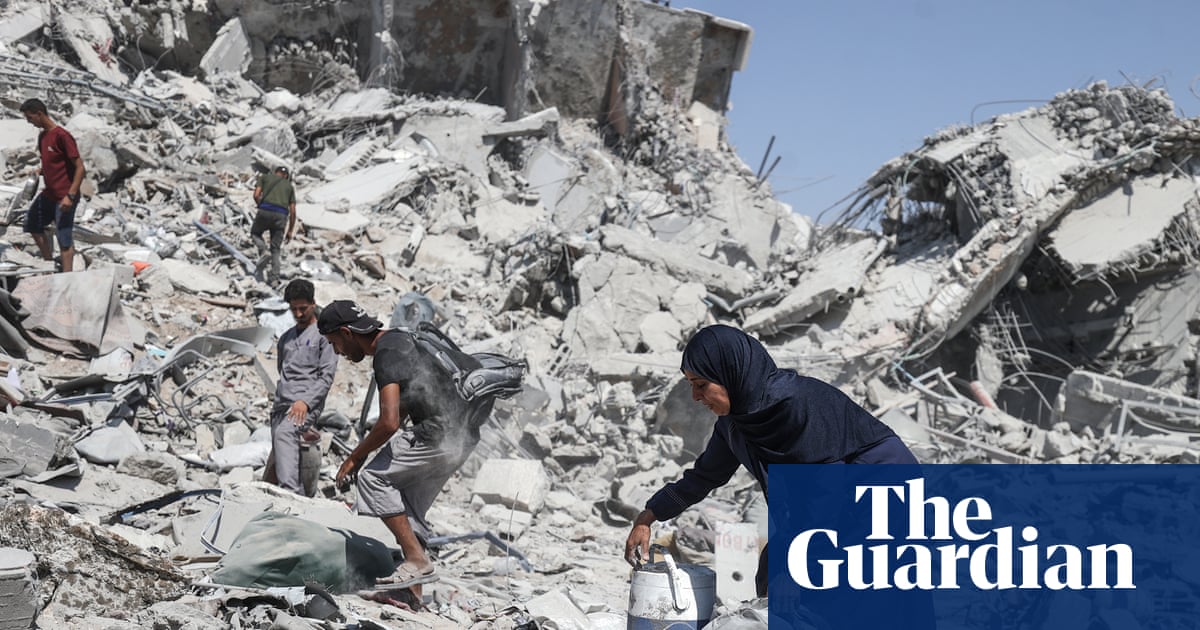A potential UN-endorsed reconstruction plan for Gaza, including a one-year technocratic government, an international stabilisation force, disarmament of Hamas and a rejection of mass deportation of Palestinians, is being discussed with the US to prevent the UN general assembly descending into a bitter row about the symbolic recognition of Palestine as a state.
It is almost certain that the UK, France, Canada, Belgium and Malta will recognise the state of Palestine at a UN conference on 22 September to be held on the sidelines of the general assembly, in the week when world leaders deliver major speeches.
Britain had suggested it may not recognise Palestine if Israel and Hamas reached a ceasefire, but the Israeli government has adamantly rejected a ceasefire and announced an intention to capture Gaza City.
However, Britain is eager for the two-state conference not to be dominated by a row about whether recognition is premature or a reward for Hamas, which is the charge mounted by the Israeli government.
In a weekend visit to Qatar, the United Arab Emirates and Saudi Arabia, the UK foreign secretary, David Lammy, said he was focusing on the need “to turn any ceasefire into a durable peace, through a monitoring mechanism, the disarmament of Hamas and a new governance framework for Gaza”.
Benjamin Netanyahu, Israel’s prime minister, who faces internal divisions within his coalition, has not spelled out a full vision for a postwar Gaza, but has increasingly spoken of a permanent Israeli presence in Gaza and annexation of the West Bank.
The plans for a UN-endorsed Gaza reconstruction are being discussed in detail with Marco Rubio, the US secretary of state, who has warned that the Israeli threat to annex the West Bank is a wholly predictable reciprocal response to Europe taking the step of recognising Palestine.
It is expected that the Palestinian Authority president, Mahmoud Abbas, will visit London before the UN conference. The US has announced it will not give visas to Abbas and the authority’s delegation for the general assembly, a decision Europeans are protesting against on the grounds that a reformed Palestinian Authority is essential to a ceasefire and the future governance of Palestine.
Plans reportedly floated in the White House that in effect endorse Israeli annexation of Gaza and the West Bank are anathema to the European and Gulf leaders. “Displacement is not an option and it is a red line for Egypt, and we will not allow it to happen,” the Egyptian foreign minister, Badr Abdelatty, said on Friday.
Tony Blair, close to many Gulf leaders as well as Jared Kushner, Donald Trump’s son-in-law, has been in discussion with the UK Foreign Office and met Trump last week in the White House.
The two most controversial issues remain the disarmament of Hamas, a requirement of all European leaders, and whether candidates linked in the past to Hamas or terrorism will be able to stand in any elections for the Palestinian presidency and parliament.
Speaking this week at the Chatham House thinktank, Dr Husam Zomlot, the Palestinian representative in the UK, said the Palestinian Authority was committed to staging elections in Gaza and the West Bank, including East Jerusalem, within a year of a ceasefire. A technocratic government would govern Palestine in the meantime.
after newsletter promotion
On the issue of Hamas figures standing in the later elections, Zomlot said: “It will be up to internal revisions within Hamas. I assure you the Palestinian people are very clever; they will elect the people that will actually serve them best.”
He added: “There had to be one law, one government, one police force. We will do that because the main requirement right now is to keep our unity of territorial system, but in the end Hamas is part of the Palestinian political, national and social fabric, and they will not just disappear in a second. What we are discussing is not erasure, but reform, change in direction and internal dialogue, so we avert Israel’s complete annihilation project.”
At a preliminary two-state solution conference in New York in June, Arab and Muslim states, including Qatar, Saudi Arabia and Egypt, for the first time issued a joint call for Hamas to disarm and relinquish power in the Gaza Strip as part of efforts to end the war in the territory.
The 22-member Arab League, the entire EU and another 17 countries backed the declaration that read: “The governance, law enforcement and security across all Palestinian territory must lie solely with the Palestinian Authority, with appropriate international support,” adding that “in the context of ending the war in Gaza, Hamas must end its rule in Gaza and hand over its weapons to the Palestinian Authority, with international engagement and support, in line with the objective of a sovereign and independent Palestinian state”.
